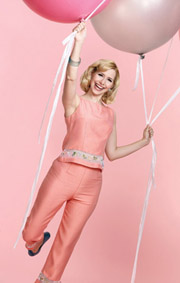The balloon high & blueberry pie of Nellie McKay, channelling Doris Day.
By Steven Foster
Photos by Caroline Knopf
See also: Adopt Hank!

It begins, most obviously, with the articulation of her name. The “Kay” appears to rhyme with “day” but instead rhymes with “die.” This disjunct is symbolic of everything about Nellie McKay. She seems, in photographs and on paper, as a sweet, doll-like charmer. But McKay is no amusement park kewpie. Beguiling, true, but artistically and intellectually McKay confounds easy expectations, refusing to be placed peacefully onto some neat, categorized pop music shelf.
McKay slipped into the musical edgestream a scant six years ago by disarming critics with lyrics of surgical-strike precision, softened by the dizzy anesthesia of her voice, which floated dreamily along buoyant cabaret-from-another-planet musical melodies. The discerning college crowd and choosy gay music lovers followed accordingly, drawn to songs like “Cupcake,” where she channeled a disco dancer who relented to the concept of gay marriage, and tunes such as “Won’t U Please B Nice” that expressed the childlike sweetness of loving infatuation in one verse while revealing murderous adult ardor in the next. “If you would sit oh so close to me/that would be nice like it’s supposed to be . . . If you don’t I’ll slit your throat.” None of the bloodlaced lyricism was mere artistic posturing, either. With only one album under her belt, McKay demanded her record label greenlight a double disc CD of more than 20 songs for her sophomore effort. When the label balked, she coughed up her own cash to complete the project, and sweet-talked legendary Elvis Costello producer Geoff Emerick to finish the album gratis. Then she proceeded to trashtalk the record company in every interview, never losing her trilling lilt of a voice. Of course, the press turned her into a shrew, a troublemaker, the Lindsay Lohan of alt-pop. They loved her, but every critical pat on the back felt strangely like a slap in the face.
“I don’t know how a lot of people do it,” admits McKay while on tour in Seattle. “A lot of people, they just have that kind of shameless quality where they don’t care what people say about them. Or maybe they do have it and they just put on the armor. I don’t know, every day I wonder if I’m doing the right thing.”
Second guessing aside, McKay’s obviously doing something right. Her new album, Normal as Blueberry Pie, a tribute to the classic crooner Doris Day, was gloriously received and is selling briskly. McKay’s voice is tailor–made to follow Day’s, and what she lacks in crystalline clarity of Day’s unique pipes, McKay more than compensates for with attitude and style. Blueberry Pie manages to channel Day’s playful musical narrative, while infusing each song with McKay’s own champagne chanteuse sensibilities. The closer you spin into McKay’s dizzying orbit, it’s easy to see why the singer has such an affinity for Day.
Doris Day was always known for her voice. But it was the naughty wink sex comedies of the ’60s that made Day an international superstar and box-office draw, showcasing Day’s peerless skin, blue sky eyes, white gold hair, and perfect but modestly couture-draped body, as well as her impeccable comedic timing. But Day’s real life more closely resembled her shattering turn as a Hitchcock blonde in the tortuous classic The Man Who Knew Too Much. The hotel scene where cinematic husband Jimmy Stewart tells Day’s character their son has been kidnapped is almost too wrenching to take, and, sadly, it was this role that was truer to life than any bubble-bath romantic farce with closeted actor co-star (and best friend) Rock Hudson. In reality, a gay husband would have been a welcome relief. Day’s real-life spouses were, at best, thieves, making off with her significant fortune, and at the brutal worst, physically abusive, jealous, tyrannical alcoholics.
As the sexualized ’70s cast Day into irrelevance, she drifted away to her 11-acre Carmel ranch, appearing in public only when causes near and dear to her heart forced her to show her face and, once again, grace the world with that intoxicating voice, if not in song, in support. She famously stood by Hudson’s side as the actor, gaunt and ghostly from the ravages of AIDS, admitted he was dying from the disease. But her less-than-secret love, of course, was for animals. Day hosted a show about animals that aired on the Christian Broadcasting Network, and continued to raise awareness for animal rights, though she preferred the role of silent supporter over celebrity spokesperson. The only time anyone can truly count on hearing from Day is when one of the oldest classic radio stations in the country celebrates her birthday. Every year Day faithfully calls the station to have a birthday chat, only to vanish again to her ranch, content to spend her days and nights with the only companions she knew would never break her heart—her dogs. And it was this pet passion that brought the worlds of Doris Day and Nellie McKay together, though McKay was primed for Day’s classic sound before she was even aware of the singer’s canon.
“We found these eight tracks at the Salvation Army,” McKay recalls. “And my mother would listen to Blood, Sweat & Tears, and I would listen to Tommy Dorsey.” This musical taste—more Billie Holiday than Backstreet Boy—was just one of the traits that made McKay somewhat of an outsider in her social circle. Instead of fitting in to whatever Heathers’ peer group was in power vogue at the time, McKay forged her own way, opting for personal passion rather than a mass-mall mindset. She took to social activism, and it was during one such rally that she first encountered Doris Day’s music.
“I was at an aquarium protest in Baltimore, and I went to a music store,” explains McKay. There, she found a Doris Day album, as bright and luminous and fake as the aquarium she was protesting. “I liked the cover. It was a very kinda kitsch cover. It was during her earlier Warner Brothers days, so it was the late ’40s, and the hair was in an up-do, and she was in an evening gown with . . . I think it was a cape, and she was on a boat. It was a fake boat with a fake sky, and it really appealed to me. So I picked it up, and I listened to it on the bus ride home from the protest, and I was just smitten.”
Still, McKay was no fool and realized early on that the music “appealed to a more romantic time, even if that time never really existed.” This wry appraisal of the real world behind the soft-focus façade is what gives McKay’s original work its acerbic appeal. She may sound like a pillow-talk sweetie, but she understands that more often than not the bed is made of nails.
However, Day would continue to show up in McKay’s path, by almost magical Hollywood plot coincidences. The New York Times would ask her to review Day’s biography. Knowing the two singers shared a proclivity for animal-rights issues, The Bark asked her to interview Day.
“I always heard about her [activism]. Dick Gregory or Sandy Dennis or Sid Caesar, Julie Christie, you start to see things in the animal-rights newsletters and stuff. Pink. They say getting involved with politics will hurt your career, but I can’t tell you the number of people I’ve bought because they fight for the animals or civil rights, gay rights, women’s rights. Because even if you don’t like what they sound like, sometimes you like what they stand for, you know? Or even if you just like one song, you buy the whole album because you want to support them.”
Support turned to emulation pretty quickly. But if McKay was going to honor Day, she would do so with painstaking precision, right down to the vintage microphones used to record the tracks.
“Singing into those old microphones, those same microphones you see in old pictures of Doris Day or Billie Holiday or Frank Sinatra—that was just delightful,” swoons McKay. The recreation of a long-gone studio aesthetic only enhanced the recording process, imbuing the sessions with a stirring authenticity that was palpable. McKay smiles. “When you feel like you got it, it’s such a great feeling.”
That emotion is apparent on the album, coming through in delightful, candy-colored pastel playfulness. When McKay sings “Go on now, shoo! Shoo!” you practically see animated birds fluttering out of her path. And while it sounds impossibly or annoyingly cute, somehow it works. Perhaps that’s because Normal as Blueberry Pie engages all the standard glockenspiel of a musical era that skipped through influences as easily as a musical heroine would hop down a backlot lane, never landing in one spot long enough to wear out its welcome. There’s a little Calypso spice, bluesy brushes on a drum kit, background vocal doo-wop call and response, and bubbly vocals that tickle the ears like so much audio Perrier. The CD manages to honor the musical styling of Day vocally, yet is wholly owned and fleshed out by McKay’s musical dexterity. She might not possess the icon’s uniquely glassine vocal clarity, but she nails the gentle exuberance and airy poetry that is pure Doris Day.
“I just wanted to do a good album, knowing that we’d have to get the arrangements together, and wanting to do something different. I still don’t know if it was a good idea, but I’m glad we did it.” Critics agree, handing McKay some of the most adoring reviews of her career. But lest one think McKay’s going to be pigeonholed, think again. After all, this is a woman who played Peggy Lee like PJ Harvey, starred on Broadway in The Threepenny Opera, stealing the spotlight from bigger costars Cyndi Lauper and Alan Cumming, and even tried her hand at stand-up. “Very badly,” she admits somewhat jokingly. “I consider myself a fairly cantankerous person, but I’m not nearly bitter enough to do comedy.”
That restless artistic daring recently brought a call from the Alley Theatre. The Tony-winning company has just commissioned McKay to pen a musical for their upcoming season.
“I have to have my first draft by next May. One of the sponsors sent me a bunch of books of French literature, so I’m still working my way through them, but I think it’ll probably be a more contemporary story. I think they’re hoping it will be something about tough times, so it will be reflective of what’s going on now.”
That musical may have to be written on the road. McKay and her band are on tour right now to support the album, and the cabaret act is a hot ticket. “We just came from San Francisco. We were rehearsing and cursing the day the album came out, but somehow it’s all paid off. We just did six shows there. And now we’re in Seattle. The band is real truants, they’re rebels. You never know what they’re going to do.” That rebel spirit should play well when Nellie and company take to Craig Ferguson’s show on November 11.

Until then, McKay is content to just keep moving, whether it’s on the tour bus or walking her dogs around Central Park, which is a fitting respite for someone who just tackled a tribute to one of America’s most beloved musical treasures. Sure she felt the pressure. But McKay admittedly enjoyed the entire experience.
“I did,” she confesses in her charming, almost boozy cartoon voice. “More so at certain points, because sometimes you reach a quandary. I don’t deal with stress the best.”
She giggles.
“It’s like Doris Day in Midnight Lace. You’re going insane.”
Perhaps, perhaps, perhaps. But like Day’s lighter cinematic romps, it’s a fun kind of crazy.
_______________________
Adopt Hank!
Posing pretty with McKay (in the photo accompanying this article), Hank is actually a foster dog looking for a good home. To adopt Hank, contact Emily@inourhandsrescue.org. Maybe if you ask nicely, Emily will throw in the necklace.










